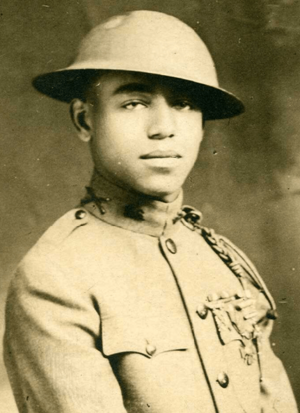Needham Roberts facts for kids
Quick facts for kids
Needham Roberts
|
|
|---|---|

Roberts as depicted in the May 1919 edition of The Crisis
|
|
| Born | April 28, 1901 Trenton, New Jersey, US |
| Died | April 18, 1949 (aged 47) Newark, New Jersey, US |
| Buried |
Fairmount Cemetery, Newark, New Jersey, US
|
| Allegiance | |
| Service/ |
|
| Years of service | 1917–1919 |
| Rank | Private |
| Unit | |
| Wars | World War I |
| Awards | |
Needham Roberts (April 28, 1901 – April 18, 1949) was an American soldier in the Harlem Hellfighters and recipient of the Purple Heart and the Croix de Guerre for his valor during World War I.
Contents
Early life
Roberts was born in Trenton, New Jersey on April 28, 1901, the son of Emma Roberts and the Reverend Norman Roberts, who had moved to New Jersey from North Carolina in 1890. He sometimes spelled his first name as "Neadom", which is how it appears on his grave marker. Roberts was raised on Trenton's Wilson Street, graduated from Lincoln Elementary School and attended high school, but dropped out before graduating so he could begin working, first as a hotel bellhop, and later as a clerk in a drugstore. At the start of US involvement in World War I in 1917, the sixteen-year-old Roberts lied about his age so he could enlist in the United States Army. He was assigned to the 369th Infantry Regiment, a unit of the 92nd Division.
World War I
While on guard duty on May 14, 1918, Roberts and private William Henry Johnson fought off a 24-man German patrol, though both were severely wounded. Both were awarded the Croix de Guerre to recognize their heroism. They also received the Purple Heart in 1932; for Johnson, this was a posthumous award. In 2002, Johnson was posthumously awarded the Distinguished Service Cross; in 2015 Johnson's award was upgraded to the Medal of Honor.
Post-war
Roberts was disabled by his wounds, and unable to maintain steady employment. He occasionally gave paid lectures about his wartime experiences, and in the early 1940s gave radio addresses and other speeches as part of the Army's effort to recruit African-Americans for World War II.
Death and burial
Roberts died in Newark, New Jersey on April 18, 1949, and was buried at Fairmount Cemetery in Newark.

